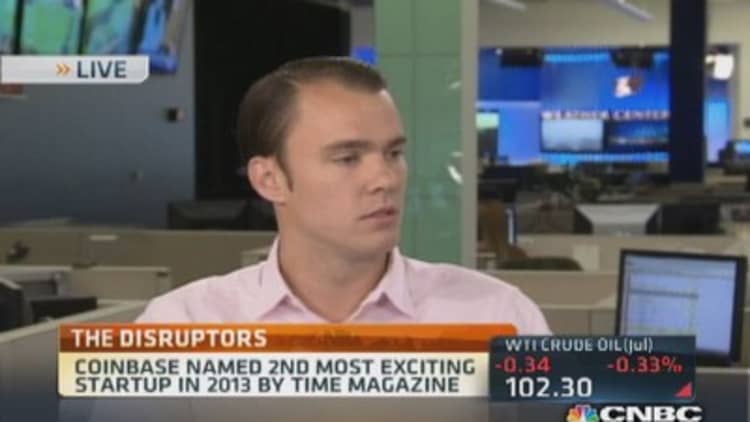
Advocates see them as the future of finance, critics see them as scams, and a lot of early investors are profiting from the eye-popping returns generated in the rapidly expanding world of digital currencies. So how should the average investor navigate the changing landscape? Very carefully.
“If the individual investor has a high risk tolerance, yes, they could invest,” said Nicholas Colas, chief market strategist at ConvergEx. “But it’s an amazingly risky investment and borders on a purely speculative punt.”
There are hundreds of online currencies out there—327, according to the website Coinmarketcap.com. The best known among them is bitcoin. The creation of an unknown programmer or group of programmers, bitcoin grabbed headlines last year largely because it rose more than 6,200 percent before falling again—it has recently hovered around $600. The wealth created by bitcoin has prompted firms ranging from Overstock.com to Dish Network and Expedia to start accepting bitcoin payments. It has also spawned hundreds of new businesses looking to cash in on the digital currency craze.
For investors looking to cash in, investments can be made in three primary ways: in the companies building businesses in the emerging space; buying the computer-generated currencies outright; or researching the investment funds being created to hold digital currencies.
For a direct investment in a digital currency, ConvergEx’s Colas said investors should look for two traits: longevity and durability.
“I’d want to see any online currency last for two years without breaking down” before making any investment, Colas said.
Read More4 ways you can use your money to help end Wall Street
Two other critical mileposts: regulation and adoption. Regulation will grant legitimacy to a digital currency and pave the way for greater adoption by consumers and businesses.
“I believe digital currency is now a new asset class and will end up as a core part of an investor’s portfolio,” said Barry Silbert, founder of SecondMarket, an exchange for private investments, and creator of the private Bitcoin Investment Trust.
Silbert cautioned investors that “the vast majority of these currencies will never gain traction. A lot of them are pump-and-dump-type schemes.”
Their value is largely speculative. It’s lesser fools making money from lesser fools. I would tell them (investors) don’t invest in bitcoin but to invest in the companies that are building on the technology.
Brad Templeton
director of the Electronic Frontier Foundation
Silbert is betting that bitcoin will emerge the winner in the digital currency space. He cited two reasons: Biticoin is the first digital currency to gain relatively broad acceptance, reflected in a market cap of $8.1 billion. That dwarfs its nearest competitor, Litecoin, with a market cap of $313 million. Second, bitcoin’s core development team is constantly upgrading the bitcoin protocol, allowing for the addition of new features that Silbert said give it a competitive advantage.
“I give everyone the same advice,” Silbert said. “A purchase or investment in bitcoin is an investment in this entire revolution, so buying the currency itself is kind of like making an index play. So if the entire industry succeeds or fails, the price of bitcoin will reflect it.”
Not everyone who is interested in bitcoin is interested in the digital currency as an investment. Internet entrepreneur Brad Templeton, who also is a director of the Electronic Frontier Foundation, finds the technology underpinning digital currencies “exciting” but would not buy the currencies themselves.
“Their value is largely speculative. It’s lesser fools making money from lesser fools,” said Templeton. “I would tell them (investors) don’t invest in bitcoin but to invest in the companies that are building on the technology.”
Read MoreMeet the CNBC Disruptor 50
Templeton believes the big challenge with bitcoin as a currency is that there is nothing backing it other than supply and demand. Bitcoin’s supply is determined by its computer code, not by a central bank. Libertarian advocates hail this feature because it means the currency is free of any manipulation by a central bank or government. Templeton said this also makes it much harder to determine what bitcoin’s stable value would be, and stability is critical to achieving wider acceptance.
Leading edge of the ledger

Templeton said the bitcoin protocol holds great potential to revolutionize financial services. He compares it to the Internet, a very simple and stupid program that allows innovators to create very smart applications to layer on top of it. Bitcoin is similar to the Internet and will allow programmers to create new applications for an industry that is resistant to change.
“In the current financial system, it is very hard to come up with new things,” Templeton said, because getting a new idea up the corporate ladder and then past regulators can be too time consuming.
That’s part of the bitcoin excitement: It’s a tool for innovation without having to go through an entrenched system.
“It’s a ledger that everyone can trust,” Templeton said.
Read MoreHave an investing idea? Build your own ETF
Right now people are using bitcoin to make direct payments from one wallet to another, payments that are verified by a community of bitcoin miners, or computers that track each and every bitcoin transaction. Templeton expects bitcoin to be used for more than financial transactions in the future. Bitcoin will likely be used to transfer “smart contracts,” including wills and deeds to properties directly between two parties without a middleman.
This may be years away. In the interim, Templeton said an investor’s best bet would be to put money into companies that are focused on making the bitcoin ecosphere more secure and less vulnerable to theft and hacking, or to invest in firms that are creating applications that make it easier to store, buy and pay with bitcoin, such as 2014 CNBC Disruptor No. 35 Coinbase.
Unfortunately, investing in these firms is no easy task. Most of the companies are being funded by venture capital firms, and an individual would have to be an accredited investor to gain access to these firms. To be considered an accredited investor, a person needs to have a net worth of more than a million dollars, excluding their primary residence. A barrier to entry in the digital space that the average retail investor may not be able to clear.


